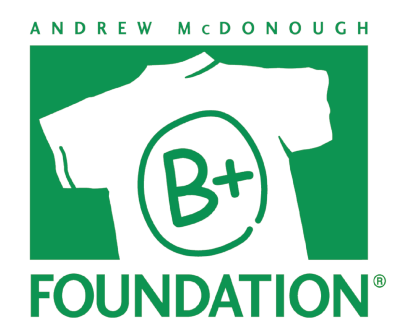The Research News Just Keeps Getting Better!
At the recent 2015 Annual Meeting of the American Association for Cancer Research (AACR), a tremendously exciting update was shared regarding the immunotherapy research being conducted at the Ben Towne Center for Childhood Cancer Research at Seattle Children's Hospital. As you'll recall, this is one of the many exciting areas of research that you - The Andrew McDonough B+ Foundation - are helping to fund. You should feel very proud.
In short, the children in this clinical trial previously would have had an expected survival rate of 15% and the researchers are now observing a 91% rate of complete remission following participation in the study! Not only is this, obviously, the greatest gift for those families impacted, but it now opens up the door to expand this trial to more children and expand beyond relapsed leukemia patients.
That's the topline...if you'd like to read the more technical summary, please see below.
CAR T-Cell Therapy Surpasses 90% Complete Remission Rate in Pediatric ALL
Author: Andrew J. Roth
The chimeric antigen receptor (CAR) T-cell therapy JCAR017 elicited a 91% complete remission rate in pediatric patients with relapsed/refractory acute lymphoblastic leukemia (ALL), according to results from a phase I trial presented at the 2015 AACR Annual Meeting.
In the intent-to-treat population, complete remissions were observed in 20 of 22 patients, as measured by flow cytometry. Complete remissions were seen with all doses of JCAR017 and in patients treated with prior CD19-targeted therapy. Severe neurotoxicity and/or severe cytokine release syndrome was observed in 8 patients. In total, 4 patients have relapsed—only one of which had CD19-positive disease.
“The 91% remission rate in this phase I study of JCAR017 is highly encouraging, particularly when considering these pediatric patients failed to respond to standard treatments,” Michael Jensen, MD, said in a statement. “Based on these results we are eager to advance this study, and to continue advancing the use of cell therapies to change how we treat cancer and provide patients the opportunity for better treatment options.”
Jensen is the director of the Ben Towne Center for Childhood Cancer Research at Seattle Children's Research Institute and scientific co-founder of Juno Therapeutics, the company developing the therapy. JCAR017 is being explored in an ongoing phase I/II study for pediatric and young adult patients with relapsed/refractory CD19-positive leukemia at the Seattle Children's Hospital.
The study plans to enroll 80 patients. The phase I portion enrolled patients who had undergone an allogeneic hematopoietic cell transplant. The second phase of the study is open to patients, regardless of prior transplant status (NCT02028455).
"Given the impressive clinical results with this defined cell product candidate, we are encouraged to begin testing of JCAR017 in adult patients with B cell malignancies, including non-Hodgkin lymphoma, later this year," Hans Bishop, chief executive officer of Juno Therapeutics, said in a statement.
In addition to JCAR017, Juno currently has three other CAR and T cell receptor therapies being evaluated in clinical trials. The furthest along is JCAR015, which received a breakthrough therapy designation from the FDA as a treatment for patients with relapsed or refractory B-cell ALL in November 2014.
JCAR015 is being investigated in two phase I clinical trials. One trial is examining the agent in precursor B cell ALL, the setting in which the agent gained its orphan drug designation (NCT01840566). In the other trial, patients with relapsed/refractory aggressive B cell non-Hodgkin lymphoma (NHL) are being treated with high dose therapy and autologous stem cell transplantation followed by infusion of JCAR015 (NCT01044069).
Future clinical trials are planned to explore Juno’s CAR T cell therapies in combination with immune checkpoint inhibitors. Recently, Juno and MedImmune, the biologics research and development arm of AstraZeneca, announced an agreement focused on the clinical development of combination strategies.
Under the non-exclusive collaboration, MedImmune and Juno will jointly fund a phase Ib study that will explore one of Juno's CD19-directed CAR T cell therapies in combination with the PD-L1 inhibitor MEDI4736 as a treatment for patients with NHL. Exact details of the study were not released. It is expected to begin later this year.
"We believe combination strategies such as this will help us better understand the full potential of our engineered T cell platform in both hematological and solid tumor settings," Mark W. Frohlich, MD, executive vice president, Research & Development, Juno Therapeutics, said in a statement.
MEDI4736 is currently being evaluated in phase III clinical trials. The agent is being looked at alone and in combination with the CTLA-4 antibody tremelimumab across the spectrum of non-small cell lung cancer and in patients with head and neck cancer who have failed prior chemotherapy.
Competition in the field of immuno-oncology has resulted in collaborations between several pharmaceutical companies, outside of the Juno deal. This is evident in the field of CAR-modified T-cell therapy, where collaborations exist between Novartis and the University of Pennsylvania (CTL019) and between Kite Pharma and the NCI (KTE-C19).
In the pediatric oncology space, results from the breakthrough therapy CTL019 were presented at the 2014 ASH Annual Meeting and demonstrated similar findings to those announced for JCAR017. In this phase I trial of 39 pediatric patients with relapsed/refractory ALL, CTL019 demonstrated a 92% complete remission rate. In total, 85% of patients who achieve a complete remission tested MRD-negative by flow cytometry.
